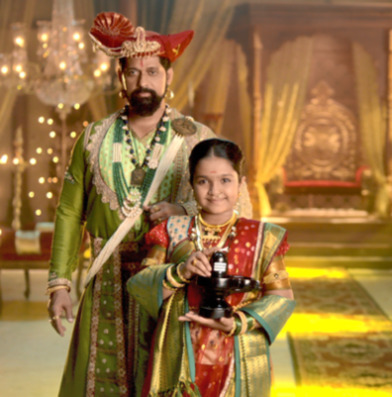Born in an ordinary family, circumstances and character turned Ahilyabai Holkar into an extraordinary woman, who ruled Malwa in the 18th Century. In the digital age she can arguably emerge as an icon for gender equality on principles that are not rooted in the Western tradition of feminism. The life and times of the 18the Century ruler of Malwa are now enlivened on the small screen by the well mounted Hindi serial Punyashlok Ahilyabai on Sony TV.
Describing her story as inspiring, the producer of the serial, Nitin Vaidya, says, “the period in which she became queen of Malwa was such that no one could have imagined a woman becoming a ruler. She did become the ruler and the way she ruled her empire was very interesting, full of drama, devotion and dedication. So telling this tale in a TV show format, we thought, would definitely catch viewers’ imagination.” And it does!

Nitin Vaidya
Ahilyabai’s life is full of twists and turns, so much so that it seems like fiction. Daughter of the headman of Chaundi village in present-day Maharashtra, Mankoji Shinde, she was taught to read and write by her father, and impressed Malhar Rao Holkar, the commander of Peshwa, with her courage, piety, empathy, egalitarian approach and fairness. Holkar got her married to his son and later after the death of her husband, son and father-in-law took over the reign. The show portrays Ahilya’s attributes from childhood to her rule as the queen of Malwa vividly. For instance, keeping aside the ritualistic conventions, she releases a mother cow to allow her to nurse her calf. When the offended priest declares her guilty and prescribes the penance of carrying the holy water from a faraway river, she quietly accepts and does it, displaying her resilience and resoluteness. The episodes are replete of such stories, thus collaborating why history has marked a special place for Ahilya.
On assuming charge of Malwa, Ahilya proved more than a match for her male counterparts. She rode with the soldiers to defend her place and people, and ruled without bias. “She took many path-breaking steps. From giving women the right to property to creating women’s army. She made them economically self-reliant,” observes Vaidya. It is said that she hired craftsmen from Surat and Malwa to design Maheshwari sari, which became famous and is still popular. In an age, when Indian women are breaking the glass ceiling by joining the Army and Air Force, heading corporates and heading banks, Vaidya feels Ahilya’s achievements will surely resonate with the audience. “Her relevance is definitely there to inspire billion imagination among India’s women, especially the young girls.” The show will surely impress the audience about the importance of Government’s ‘Beti Bachao, Beti Padhao’ movement which stresses on women education and gender parity.
The serial does well to highlight the role of the father-in-law, Holkar, who spots Ahilya’s rare qualities, making him choose her as his daughter-in-law, honing her skills and imparting her confidence that allows her to assume charge. In those conservative days, he took the bold step of not allowing Ahilya to commit sati when his son Khanderao Holkar died. This unique bond and Holkar’s unflinching support should be an inspiration for many, feels Vaidya.
On the issue of ensuring authenticity of historical facts of the show, Vaidya reveals that “it took three years to shape the story”. Written by Shirish Latkar, the production house took the help of writer-scholar Sanjay Sonawani, who has written books on the Holkar dynasty. Keeping in mind the visual appeal of the show, the costumes, garments and ornaments too have been well researched. “Besides, Internet resources, we specifically consulted ‘Costumes And Textiles Of Royal India’ by Ritu Kumar, ‘Indian Costumes’ by Anamika Pathak,”he said. The cast in the episodes aired till now have all done well. The main lead of young Ahilya and her father-in-law are being essayed by child actress Aditi Jaltare and well-known TV actor Rajesh Shringarpore, both of whom have brought out the nuances of the character well.
(On air on Sony TV, from Monday to Friday, 7.30 p.m.)




















